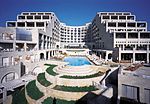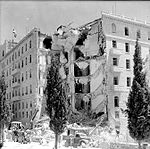Ma'aman Allah (Mamilla) Cemetery (Arabic: مقبرة مأمن الله) is a historic Muslim cemetery in West Jerusalem that dates back to the Crusades, and lies just to the west of the north-west corner of the walls of the Old City of Jerusalem, near the New Gate. The cemetery, at the center of which lies the Mamilla Pool, contains the remains of figures from the early Islamic period, several Sufi shrines and Mamluk-era tombs. The cemetery grounds also contain the bodies of thousands of Christians killed in the pre-Islamic era, as well as several tombs from the time of the Crusades.
Its identity as an Islamic cemetery is noted by Arab and Persian writers as early as the 11th century, and it has been characterized as "the largest and most important Muslim cemetery in all of Palestine". It was used as a burial site up until 1927 when the Supreme Muslim Council decided to preserve it as a historic site. Following the 1948 Arab–Israeli War, the cemetery and other waqf properties in West Jerusalem fell under the control of Israeli governmental bodies. The Israeli Ministry of Religious Affairs stated in 1948 that the cemetery is: "one of the most prominent Muslim cemeteries, where seventy thousand Muslim warriors of [Saladin’s] armies are interred along with many Muslim scholars... Israel, will always know to protect and respect this site."A number of buildings, a road and other public facilities, such as a park, a parking lot and public lavatories have since been constructed on the cemetery grounds, destroying grave markers and tombs. A plan to build a Museum of Tolerance on part of the cemetery grounds, announced in 2004, aroused much controversy and faced several stop work orders before being given final approval in July 2011.












